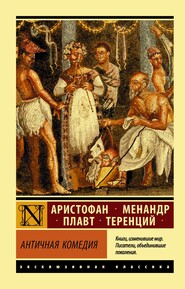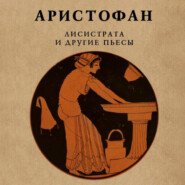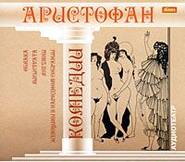По всем вопросам обращайтесь на: info@litportal.ru
(©) 2003-2024.
✖
The Eleven Comedies, Volume 1
Автор
Год написания книги
2018
Настройки чтения
Размер шрифта
Высота строк
Поля
258
A deme and frontier fortress of Attica, near the Boeotian border.
259
An Athenian physician of the day.
260
An allusion to the paroxysms of rage, as represented in many tragedies familiar to an Athenian audience, of Orestes, the son of Agamemnon, after he had killed his mother.
261
No doubt the comic poet, rival of Aristophanes.
262
Unexpected wind-up of the story. Aristophanes intends to deride the boasting of Lamachus, who was always ascribing to himself most unlikely exploits.
263
An obscene allusion, the faeces of catamites being 'well ground' from the treatment they are in the habit of submitting to.
264
'Peace' was no doubt produced at the festival of the Apaturia, which was kept at the end of October, a period when strangers were numerous in Athens.
265
The winged steed of Perseus—an allusion to a lost tragedy of Euripides, in which Bellerophon was introduced riding on Pegasus.
266
Fearing that if it caught a whiff from earth to its liking, the beetle might descend from the highest heaven to satisfy itself.
267
The Persians and the Spartans were not then allied as the Scholiast states, since a treaty between them was only concluded in 412 B.C., i.e. eight years after the production of 'Peace'; the great king, however, was trying to derive advantages out of the dissensions in Greece.
268
Go to the crows, a proverbial expression equivalent to our Go to the devil.
269
Aesop tells us that the eagle and the beetle were at war; the eagle devoured the beetle's young and the latter got into its nest and tumbled out its eggs. On this the eagle complained to Zeus, who advised it to lay its eggs in his bosom; but the beetle flew up to the abode of Zeus, who, forgetful of the eagle's eggs, at once rose to chase off the objectionable insect. The eggs fell to earth and were smashed to bits.
270
Pegasus is introduced by Euripides both in his 'Andromeda' and his 'Bellerophon.'
271
Boats, called 'beetles,' doubtless because in form they resembled these insects, were built at Naxos.
272
Nature had divided the Piraeus into three basins—Cantharos, Aphrodisium and Zea; [Greek: kántharos] is Greek for a dung-beetle.
273
In allusion to Euripides' fondness for introducing lame heroes in his plays.
274
An allusion to the proverbial nickname applied to the Chians—[Greek: Chios apopat_on], "shitting Chian." On account of their notoriously pederastic habits, the inhabitants of this island were known throughout Greece as 'loose-arsed' Chians, and therefore always on the point of voiding their faeces. There is a further joke, of course, in connection with the hundred and one frivolous pretexts which the Athenians invented for exacting contributions from the maritime allies.
275
Masters of Pylos and Sphacteria, the Athenians had brought home the three hundred prisoners taken in the latter place in 425 B.C.; the Spartans had several times sent envoys to offer peace and to demand back both Pylos and the prisoners, but the Athenian pride had caused these proposals to be long refused. Finally the prisoners had been given up in 423 B.C., but the War was continued nevertheless.
276
An important town in Eastern Laconia on the Argolic gulf, celebrated for a temple where a festival was held annually in honour of Achilles. It had been taken and pillaged by the Athenians in the second year of the Peloponnesian War, 430 B.C. As he utters this imprecation, War throws some leeks, [Greek: prasa], the root-word of the name Prasiae, into his mortar.
277
War throws some garlic into his mortar as emblematical of the city of Megara, where it was grown in abundance.
278
Because the smell of bruised garlic causes the eyes to water.
279
He throws cheese into the mortar as emblematical of Sicily, on account of its rich pastures.
280
Emblematical of Athens. The honey of Mount Hymettus was famous.
281
Cleon, who had lately fallen before Amphipolis, in 422 B.C.
282
An island in the Aegean Sea, on the coast of Thrace and opposite the mouth of the Hebrus; the Mysteries are said to have found their first home in this island, where the Cabirian gods were worshipped; this cult, shrouded in deep mystery to even the initiates themselves, has remained an almost insoluble problem for the modern critic. It was said that the wishes of the initiates were always granted, and they were feared as to-day the jettatori (spell-throwers, casters of the evil eye) in Sicily are feared.











